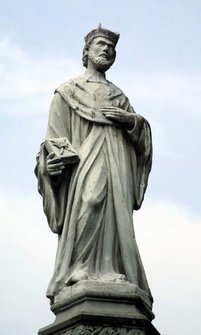
What time was left him over from his work, he gave up partly to the profit of his neighbour, more especially in preaching, and partly in prayer, wherein he is said sometimes to have had heavenly visions and messages. The sufferings of Christ took such hold upon him, that he sometimes passed whole nights without sleep in thinking thereon, and that he might more keenly realize them, he made a pilgrimage to Jerusalem. There he was seized with such a passionate longing to be a martyr, that he preached Christ crucified even to the Turks. He went four times to Rome to the thresholds of the Apostles, on foot, and laden with a wallet, partly to do honour to the Apostolic See, for which he had a great reverence, and partly (to use his own expression) that he might clear off the pains of his own purgatory by use of the Pardons for sin which are there daily offered. In one of these journeys he was set upon by highway robbers, who plundered him, and having asked him if he had any more, whereto he answered, Nay, left him and fled. Then he remembered that he had some gold pieces sewn up in his clothes. So he ran after the robbers with shouts, and offered them these also, but they were so amazed at the simplicity and charity of the holy man, that they gave him back even that which they had already taken. To hinder scandal-mongering, he wrote up upon the walls, after the ensample of holy Austin, certain texts, to be an unceasing warning to himself and others. He gave his own bread to the hungry, and clothed the naked, not with bought raiment only, but by stripping himself of his own garments and shoes, himself meanwhile letting down his own cloak to trail upon the ground, lest any should see that he returned home barefoot.
He slept very little, and that upon the ground; his clothing was enough only to clothe his nakedness, and his food to keep him alive. He kept his virgin purity guarded like a lily among thorns by rough hair-cloth, scourging, and fasting. For about thirty-five years before his death he never tasted flesh- meat. At length, when he was full of days and good works, he felt that death was near, and made himself ready to meet it by a long and careful preparation, and to be the freer, he gave to the poor everything that was left in his house. Strengthened by the Sacraments of the Church, and having a desire to depart, and to be with Christ, he took flight to heaven upon the 24th day of December, (in the year of our Lord 1473.) He was famous for miracles both before and after his death. His body was carried into the University Church of St Anne, hard by his dwelling, and there honourably buried. The popular reverence and the crowds around his sepulchre grew greater day by day, till he hath come to be held in honour as one of the chiefest holy defenders of Poland and Lithuania. At the glory of more wonders, Pope Clement XIII., upon the 16th day of July, in the year 1767, with solemn pomp, enrolled his name among those of the Saints.




